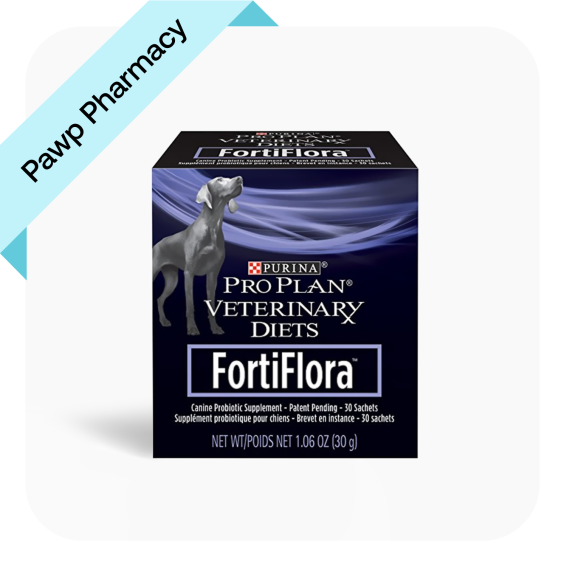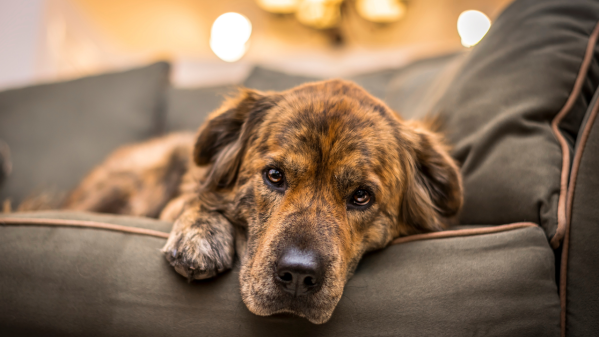If your dog is experiencing diarrhea, it can be challenging to figure out what to feed them.
The last thing you want to do is feed them something that could possibly make the situation worse. At the same time, it's important to make sure that they're still eating enough and staying hydrated.
To figure out what to feed your dog with diarrhea, it can helpful to better understand the potential cause for your pup's runny stool.
What causes diarrhea in dogs?
Diarrhea occurs when there is rapid movement of your dog’s feces through their intestine. This is combined with a decreased absorption of nutrients, electrolytes, and even water.
If diarrhea is the main symptom your pet is experiencing, there could be a relatively simple cause with an easy fix, or it could imply something more serious is going on and require medical attention.
The various causes of diarrhea in dogs include:
Changes in food or diet
Ingestion of a toxic food
Environmental stress or anxiety
Antibiotics
Allergies
Intestinal parasites
Viral or bacterial infections
Organ dysfunction
Inflammatory intestinal disease
Read: 12 Human Foods That Are Toxic To Dogs
Unless you're sure of the cause, it's important to contact a veterinarian about your dog's diarrhea so you can help them feel better as soon as possible.
What to do when my dog has diarrhea
If you notice that your dog has diarrhea, there are several steps you can take to get your pup back on track.
Talk to a vet
Your first step should be to check in with a vet so they can help you gauge how severe it is and if they will need medical treatment.
A vet will be able to help you understand if the dog diarrhea can be treated at home, if they'll need medication to recover, or if it's necessary to bring your dog into a veterinarian's office for in-person treatment.
Make sure your dog isn’t dehydrated
If your dog persistently has loose bowel movements, they are at increased risk of being dehydrated. Similar to human beings, dogs need plenty of water for their bodies to perform essential functions.
In a situation where your dog is losing more electrolytes and water than they're taking in, their health could deteriorate quickly. If they don't want to drink, you can try feeding your dog ice chips. Always make sure your pup has access to clean, fresh, cool water.
Avoid physical exertion
When your dog is experiencing diarrhea, it's best for them to lay low. For one, they could already be facing dehydration, and you wouldn’t want to make a bad situation worse by tiring them out more.
If you take them outside for a run or to play, you risk their condition worsening by ingesting something hazardous or spreading a possible infection to nearby animals.
Add a supplement
Sometimes, treatment can be as simple as adding a probiotic to your pup's diet. Products like FortiFlora promote normal intestinal health and balance and support a healthy immune system.

FortiFlora Powder for Dogs$30
Shop NowSupplements like these can help manage and shorten episodes of diarrhea, so some pet parents prefer to have this on hand if their pup gets diarrhea easily from environmental stressors.
Wait it out
If your dog is a healthy adult and the diarrhea isn’t too severe, your vet will typically suggest a more conservative, relaxed approach. They might ask you to wait it out, see how your dog is doing, and then follow up in a few days.
Sometimes they will advise you not to feed your pet for several hours, and other times, they might ask you to give easily digested foods at a certain interval. This is another reason why seeing a vet is vital; they can help you understand if a relaxed approach will do or if a more robust plan is necessary.
Adjust their diet
Some vets will recommend an adjustment to your pet’s diet.
This can also prove helpful if you are looking to prevent another bout of diarrhea from occurring in the future. A vet might recommend a prescription diet or certain foods that will allow your pet to get the nutrients they need without causing an upset stomach.
What to feed a dog with diarrhea
While many pet parents swear by feeding their pooches chicken and rice for an upset stomach, that's not always advisable, and a vet will be able to make that determination.
“The latest recommendations are that feeding chicken and rice is not ideal, as the diet isn’t considered complete and balanced," explains Pawp veterinarian Dr. Sylvalyn Hammond.
The best course of action may be to pick up a veterinary prescription diet that is specifically formulated to be gentle on the GI tract.
"I like to think of these diets as 'chicken soup' for dogs and cats," says Dr. Hammond. "But obviously, certain human foods can work in a pinch if your veterinarian’s office is closed or you're out of town.”
If you must feed them human food, it's important to make sure it's a bland diet. Here is a list of foods that some vets will recommend for dog diarrhea depending on your dog's specific case.
White rice
White rice is extremely bland, which is why it is a good option for feeding a dog with diarrhea. You likely already have this in your cupboard and it’s easy to cook at home. Plus, rice is a type of soluble fiber, making it extremely digestible by a sensitive gut.
Mashed carrots
You do not want your pet choking on this bland food, so mashing carrots makes them easier for your dog to digest. You can also try to warm them up a bit, so your dog can chew them more easily.
Boiled chicken or salmon
Chicken and salmon are two foods that can be a good solution if you're wondering what to feed your dog with diarrhea. You likely already have one or both in your home, so if your pup becomes unwell, you'll have them at the ready.
Keep in mind that some dogs have food allergies to a protein source like chicken, so make sure you consider any food sensitivities first.
Sweet potatoes
Another option is to give your dog some sweet potatoes. When you feed this to your pet in moderation, it's possible that it can help firm up their stool.
Pumpkin
Some veterinarians will recommend pumpkin for a dog with diarrhea if it is fiber responsive, however, in some cases, pumpkin can make a dog's diarrhea worse, so it's important not to diagnose and treat on your own.
Best choice: call on vet telehealth
Instead of trying to figure out what to feed your dog with diarrhea, it's best to reach out to a vet through a Pawp telehealth visit so they can get you the answers you need quickly.
Pawp’s vets will be able to suggest a course of action or, if necessary, recommend that you go to an in-person vet to get treatment. They can also recommend probiotics or dog food brands that will be more gentle on your dog's GI tract.
Sources:
Evaluation of Three Hydration Strategies in Detection Dogs Working in a Hot
Environment | Frontiers in Veterinary Science
Chronic Diarrhea in Dogs | Journal of Veterinary Internal Medicine
Effect of potato on kibble characteristics and diet digestibility and palatability to adult
dogs and puppies | Italian Journal of Animal Science
